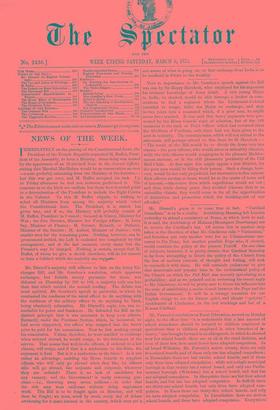Mr. Disraeli's majority still adheres to him on the Army
Ex- changes Bill, and Mr. Goschen's resolution, which approves exchanges, but forbids money payments for them, was defeated on 'Thursday by 282 to 186, a majority only one less than that which carried the second reading. The debate was most spirited, Mr. Goschen's speech in particular, in which he contrasted the readiness of the naval officer to do anything with the readiness of the military officer to do anything he liked, being absolutely exhaustive. Mr. Disraeli's reply, too, was re- markable for point and frankness. He defended the Bill on the distinct principle that it was necessary to keep your officers. Vormerly, under the Purchase System, which, he intimated, he had never supported, the officer who resigned lost the heavy price be paid for his commission. Now he lost nothing except his commission. Unless, therefore, he were enabled to exchange when ordered abroad, he would resign, to the detriment of the service. That means that well-to-do officers, if ordered to a hot climate, will resign, and if that is a misfortune to the State, the - argument is final. But is it a misfortune to the State ?. is it not rather an advantage, enabling the Horse Guards to supplant officers who will only go abroad when they like, by officers who will go abroad, like serjeants and corporals, whenever they are. ordered? There is no lack of candidates for any vacancy, and the Government • is really restoring pur- - chase—i.e., throwing away seven millions—in order that the rich may wear uniforms without doing unpleasant work. The Bill is to be fought again on Monday, and will then be fought, we trust, word by word, every day of debate awakening for it more interest in the country, which even yet is
not aware of what is going on, or that exchange from India is to be confined in future to the wealthy:


































